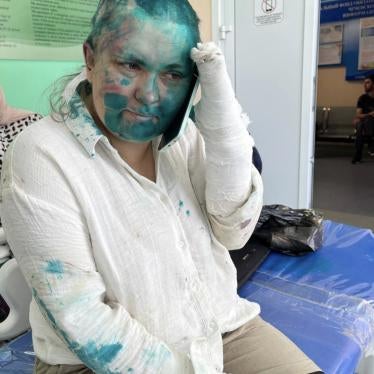Published in The Guardian
The leading Russian human rights activist Natalia Estemirova knew better than anyone the risks entailed in her work in the turbulent North Caucasus. She has died at the age of 50 after being abducted from outside her home in Grozny, capital of Chechnya last Wednesday: she was found shot dead later the same day near the village of Gazi-Yurt in neighbouring Ingushetia.
For nearly a decade she had documented rights abuses in Chechnya for the Russian human rights organisation Memorial. As a Moscow-based human rights researcher, latterly with Human Rights Watch, I met her when visiting Chechnya every few months over the past seven years, and came to know her as a colleague and close friend.
Half-Russian, half-Chechen, Natalia - or Natasha, as her friends called her - was born in the southern Russian province of Saratov. She grew up in the Urals but moved to Chechnya at the age of 19, and graduated in history from Grozny University. She taught the subject at a school in the city till 1998, when she began working for Chechen television, producing a series of programmes about victims of Russian abuses during the first Chechen war, of 1994-96.
When Russia's second military campaign in Chechnya broke out in 1999, she evacuated her young daughter to the Urals, and returned to the wartorn republic. As the conflict intensified in 2000, she joined Memorial and began working closely with Human Rights Watch. We had been co-operating ever since, and had recently been investigating the punitive killings and house burnings against people suspected by Chechen authorities of having links to rebels. She was named a top human rights defender by Human Rights Watch in 2007, received the European parliament's Robert Schuman medal in 2005, and the Right to Survival award from the Swedish parliament in 2004. Three years later she was the first recipient of the Anna Politkovskaya prize, in honour of the Russian journalist murdered in 2006.
Like dozens of other researchers and journalists, I was able to do my work in Chechnya because Natasha was there every day. She was the person whom victims trusted. Natasha's job wasn't pretty. Documenting killings, disappearances and acts of torture is downright gruesome. But she was amazingly good at it.
In fact, apart from her daughter, that was the only thing she was truly committed to. A single mother, she wanted Lana, now 15, to have a normal life.
Natasha was a beautiful woman with the dignified bearing of a ballet dancer: she liked to dress well, adored the theatre and music, and wished she had time for reading. She wanted to write a book about Chechnya, but her life was too hectic to even contemplate it. Going abroad seemed a perfect way out, and she had many offers to stay in Europe for as long as she wanted, but Natasha knew the victims of abuses needed her to give them a voice. She felt that she could not abandon them, no matter how serious the danger.
As a close friend of Politkovskaya, she felt that she owed it to "Anya" not to quit. In January this year, our good friend Stanislav Markelov, a human rights lawyer famous for his work on Chechnya abuses, was shot dead in central Moscow, and Natasha flew in for his funeral. She and I stayed up all night, talking about Markelov and Politkov- skaya and wondering who would be next in line. It proved to be Natasha. Unless the Russian government stops the lawlessness and impunity in the region, the fate of those few others who still dare work in the North Caucasus will be the same.
When your work is all about speaking to victims of abuse and their relatives and telling their stories loud and clear, you are all too aware of the risk of sharing the victims' fate: being pushed into a car, tied up, having a black bag pulled over your head, then thrown out of the vehicle and killed. Or being held and tortured. Natasha, who was kidnapped by four unknown men when leaving for work at around 8.30am, must have died instantly, shot in the chest and the back of her head.
I stayed with Natasha in Chechnya for a week before her murder, leaving the day before it happened. Together, we travelled to different villages and spoke to many people, including relatives and acquaintances of alleged insurgents whose family members had been abducted and killed, whose houses had been torched. At times, Natasha cried. No matter how many cases she documented, she always shared the victims' pain.
The night before my departure, I sat up until four in the morning drafting a news release about outrageous violations by law-enforcement and security personnel in Chechnya. I left Natasha a note on the kitchen table asking her to wake me up so that we could say goodbye properly. Natasha didn't. She reckoned that I needed an extra hour of sleep. I wish she had known better.
Natalia Khussainovna Estemirova, human rights activist, born 28 February 1959; died 15 July 2009







